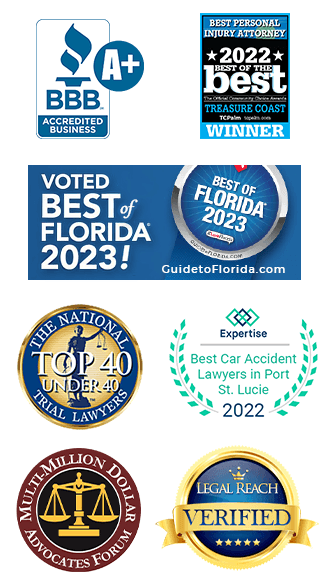Florida has the distinction of being the top vacation destination in the United States and in the world, with tourism bringing in nearly $60 billion to the state’s economy each year. Florida is also the top “snowbird state” in the country with the number of retirees taking up temporary residence during the winter months topping out at over one million. Now, unfortunately, Florida also has the distinction of being one of the states with the deadliest rural roads in America.
This month, TRIP—a nonprofit organization dedicated to researching, evaluating and distributing technical and economic data on surface transportation issues—released a study this month stating that Florida was second to South Carolina in terms of the number of fatalities per 100million miles traveled on rural, non-Interstate roads.
Florida saw 3.47 deaths to South Carolina’s 4.7 deaths. Rhode Island had the third highest number of deaths at 2.99. Florida was fourth in the country in the total number of rural non-Interstate traffic deaths in 2009, with 907.
In 2005, when Florida was named first in this same study, statistics analyzing data between 1999 and 2003 found that an average of 1,242 people died annually on Florida’s rural, non-Interstate roads and highways. Forty-one percent of traffic fatalities between 1999 and 2003 in Florida occurred on rural, non-Interstate roads and highways, even though vehicle travel on these roads accounted for only 19 percent of total vehicle travel during that period.
According to TRIP, traffic fatalities on the nation’s rural roads occur at a rate more than three times higher than all other roads. The report identified various factors as contributing to the high fatalities on rural roads, including:
- Lane widths, shoulders, curves and clearance zones along roadsides with inconsistent design features
- Narrow lanes
- Sharp curves
- Two-lane routes
- Pavement drop-offs
- Frequent turns by vehicles off rural roads
The condition of rural roads in Florida is in stark contrast to the I-10 to I-95 Interchange upgrade project, known as “The Big I.” Florida is a top 10 finalist in the “Ten Best American Transportation Projects” from the American Association of State Highway and Transportation Officials. This project consisted of 17 bridges, 21 ramps, and 25 lane miles built over and around traffic moving through one of the busiest interchanges in the state.
Floridians for Better Transportation (FBT), a statewide business and transportation association dedicated to making transportation safer and more efficient in Florida, states on their website that Florida is facing a transportation funding crisis with an additional $23 billion “needed over the next 10 years just to maintain current transportation conditions.”
The car accident attorneys at Philip DeBerard, Injury Attorney, support many of the low cost suggestions for improving the safety of Florida roadways offered by the study authors, such as the addition of rumble strips along the side of the roads and on the center lines, removing trees and rocks, moving utility poles away from the roads and upgrading or adding guardrails.
Our attorneys caution Florida drivers to pay special attention to the road and potential obstacles when traveling Florida’s rural roads. Removing distractions, driving the posted speed limit and driving sober are all within the drivers’ control to ensure they make it to their destination.
If you were injured, or a family member died, in an automobile accident or collision caused by another Florida motorist, you may have a legal right to seek compensation for your injuries.
For help with your Florida car accident claim, trust the law firm of Philip DeBerard, Injury Attorney. We serve victims of automobile crashes and bus accidents in South Florida and the Treasure Coast, including Port St. Lucie, Fort Pierce, Jupiter, Stuart, Okeechobee, Vero Beach, Palm Beach, and throughout South Florida and the Treasure Coast.
Call 1-800-299-8878 now to speak with a knowledgeable Florida car accident attorney or fill out our online contact form.




